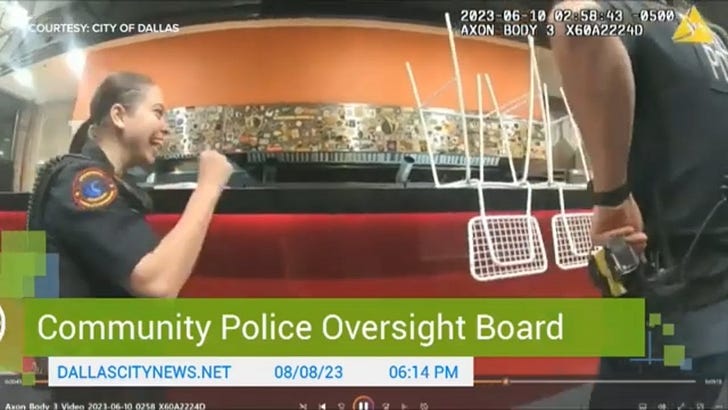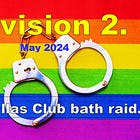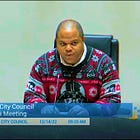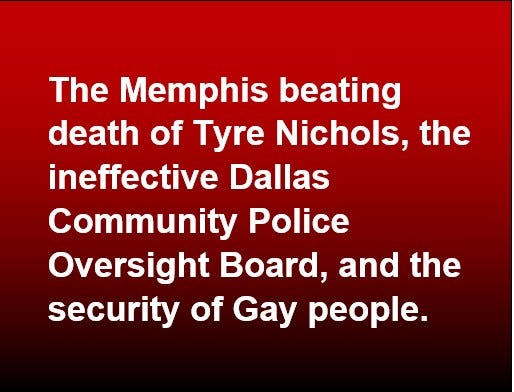The Memphis beating death, the Dallas Police Review board, and impact on Gays. UPDATES, 1,2
Historically violence has been visited on Gays by police. Though police are important as a force against Gay bashing, there needs to be concern about anti-Gay police being held accountable.
Updates 1,2
The police review board is now seen as a debacle.
The Dallas Morning News has come out for police reform and now all sorts of “civil rights leaders” have suddenly discovered the issue.
Recent article how the police review board isn’t effective. When I pointed that the new municipal code was designed so the board could be sabotaged five years ago, I was the bad guy according to the local so-called radicals, or should I say cosplaying radicals.
What this is NOT about
This is NOT about wanting to exclude the police from being in the Pride Parade or having a presence at Gay events. Their presence is a powerful message to would be Gay bashers that they aren’t gong to have the secret sympathy of the police and homophobic police officers that they won’t have the support of fellow police officers for their homophobia or the support of the administration of the police department.
Nor is this against the police.
Everyone should be accountable for their behavior and performance. Especially police, who are armed, authorized to make arrests and use physical force upon citizens based on their judgement.
I am fully aware that there is ideological conflict over the police. However, this article is narrowly on the issue of the ineffective Dallas Police Review board and the implications for the Gay community.
It is very possible that there will be attempts to dismiss my review of the municipal code as some ideological attack on the police, rather than a systematic analysis of how the code restricts the boards workings.
What this essay is about
This essay is a detailed review of the municipal code for the Community Police Oversight Board and how that board is designed by the municipal code to be largely powerless and ineffective.
It is about also, how a powerless Community Police Oversight Board which is largely a sham, will be ineffectual in discouraging potential police misconduct against Gays or investigating police misconduct or violence against Gays if it happens.
In short it is about a serious gap in the security of Gays in the City of Dallas.
If Dallas had a Human Rights Commission which it doesn’t, they likely would bring up the fact that the Community Police Oversight Board is not effective and that is probably why the Dallas establishment is dead set against a Human Rights Commission in Dallas.
Further a Human Rights Commission would likely take up issues of human rights violations by the Dallas police if any. Probably that is another reason the Dallas establishment is dead set against a Human Rights Commission. [Link to my post on the need for a Human Rights Commission in Dallas at the end of this essay.]
This is the link to the petition to get a human rights commission in Dallas.
Why this Essay
The recent police beating of a young person, Tyre Nichols, to death in Memphis should demonstrate that police departments can be rouge, or have a rouge department or a rogue group or team or individual that can inflict serious harm or death against citizens because of their deranged behavior even in the present.
An effective police review board, something that Dallas doesn’t really have, is a one element to prevent this.
We shouldn’t presume that Gays are not going to be a target of rogue police behavior of violence even unto resulting in death. It is a possibility.
The Rainbow Lounge in Forth Worth was raided on June 28, 2009 and one patron ended up with brain injury. Violence against Gays by police continues into the 21st century.
Three officers were suspended after the raid.
https://www.nbcdfw.com/news/local/three-officers-suspended-in-rainbow-lounge-raid/1861859/
However, Fort Worth, unlike Dallas, does have a human rights commission, called the human relations commission.
https://www.fortworthtexas.gov/departments/citysecretary/events/human-relations-commission-2022
From this Dallas Voice article.
https://dallasvoice.com/rainbow-lounge-raid-years/
Within days, a group of LGBT community leaders — including Camp, Anable, attorney Jon Nelson and church leader the Rev. Carol West — had formed Fairness Fort Worth. Initially intended to coordinate community response to the raid and resources for those who were arrested, FFW soon morphed into the city’s first LGBT activist/educational organization, using connections with city leaders such as gay Councilman Joel Burns and lesbian Human Relations Commission member Lisa Thomas to reach out to Halstead and other city officials.
Police officers were reprimanded and three officers with the Texas Alcoholic Beverage Commission lost their jobs.
If something happened here in Dallas, there would be no Human Relations Comission to reach out to.
Potential Police Violence Against Gays
I remember back in either the late 1970s or early 1980s a person beating up a young person in an alley way in San Francisco right off of Polk Street, a Gay neighborhood then. Overhead were apartment and people were shouting out, “We are going to call the police.” The person beating up the young person held up his police badge.
I transcribed back then a series of tapes of Gays testifying about Gay bashings. It came up that the police were often sympathetic to the Gay bashers.
That was a long time ago. Almost fifty years. Now we have fights over whether a contingent of police marching in the Pride events. Let me clear where I stand on this. I think it is a powerful message to potential Gay bashers and it is a powerful message to those police officers that might be homophobic that they can’t expect support for their homophobia from fellow officers.
My readers are free to disagree, this essay is a review of the municipal code.
The fact that police have changes over time, doesn’t preclude that an individual police officer in the future might be anti-Gay and commit some abuse of a Gay person because of his anti-Gay attitudes including violence. If an anti-Gay police officers have good reason to believe that there will be no consequences for the abuse of Gay people because of the ineffectiveness of the Community Police Oversight Board, then the Gay community in Dallas is at risk.
Large segments of the City of Dallas are members of anti-Gay churches. Dallas City Council was until very recently having persons with bigoted anti-Gay institutions giving invocations. If there was a raid on a Gay bar in Dallas like the raid on the Rainbow Lounge it is not clear at all there there would be any serious concern at Dallas City Hall. There was no concern over anti-Gay invocators.
At the recent protest against drag in Dallas, I had sent certified letters to Dallas Mayor Johnson and all the Dallas City Council members. Only two city council members showed up, and the others had no response at all including Mayor Johnson. Mayor Johnson is still having invocators involved with anti-Gay groups. I put links to the summary post about the anti-drag protest and the lastest post about Mayor Johnson and anti-Gay invocators at the end of this post.
The situation of Gays in Dallas is more fragile than the Dallas LGBT+ establishment would have you believe.
The Dallas Police raided a Gay bathhouse in 2010 and arrested eleven men.
Review of the municipal code follows this video.
Imagine how they would treat Gay people. They raided a Bathhouse in 2010. They might be arresting you when you visit.
Review of the municipal code.
This review was done 10/4/2021 and I believe it is current as to the municipal code as it currently is. Please advise if there has been further revisions.
REVIEW OF THE COMMUNITY POLICE OVERSIGHT BOARD MUNICIPAL CODE
– Ed Sebesta 10/4/2021
This is Article III, COMMUNITY POLICE OVERSIGHT BOARD in Chapter XXXVII in Volume II.
OVERVIEW
Though the title of the board included the word “Oversight,” and somewhat grand objectives are proposed and also complaints can be submitted to it, its function is so narrowly defined and even within those narrow limits, delayed, constrained and restricted such that it has limited use in terms of preventing police abuse and providing guidance for better relations between the police and the community.
The board waits for the police department to complete its internal affairs investigation (IAI), and then reviews the IAI, and then if not satisfied they can ask the City of Dallas administration to do an investigation, that is the City of Dallas to investigate its own report. There doesn’t appear much that the Board can do.
This only occurs after being considerably delayed or possibly be delayed for multiple reasons.
Additionally, what technical information might be needed to critically review the IAI report, needs to come from the same City of Dallas administration who they investigating, and exclusively from persons selected by the City of Dallas administration, and exclusively from law enforcement professionals. In terms of information and expertise which the Board might need to critically evaluate a IAI report they are in a hermetically sealed information system.
Though the Board can make suggestions on a wide variety of issues relevant to problems of police abuse, they can’t actually undertake an investigation regarding these issues as an issue by itself, but instead are restricted to making suggestions based on reviewing IAI reports.
The much-discussed subpoena power may not be used for a city employee or police officer, the persons most likely to be of interest in reviewing an IAI report. Those they can subpoena are those who likely have already testified in making a complaint. Also, given the delays the Board is subject to, the incidents and events for which they might ask witnesses about will be somewhat old.
In summary, the Board largely if not entirely is restricted to reviewing IAI reports and asking the City of Dallas administration questions about their own reports. What substantial investigations that might be done are those by the City of Dallas administration themselves through the Office of Community Police Oversight. What expertise they might seek to review these IAI reports is from the City of Dallas administration of whose performance they are reviewing.
The one function that the Board does provide is an independent channel to file a complaint. For those who have been abused by a police officer the thought of having to go to a police station to file a complaint would be daunting. It is tasked with providing an accessible process to file a complaint.
It is unclear if the Community Police Oversight Board effectively functions as a tribune for the possible victims of police abuse or a support function for the City of Dallas and the Police Department as a quality review board for them.
One additional concern is that a Board member can be removed without due process, as afforded by Section 17, Chapter XXIV of the City Charter.
The output of a police review board, however named, would be to change police behavior, such that there isn’t abuse and relations with the community improved. Recent events haven’t show that output.
FUNCTIONS OF COMMUNITY POLICE REVIEW BOARD
In Sec. 37-31.2 DUTIES the investigative duty is defined as the following.
(2) direct the director to initiate an independent administrative investigation into a complaint by a member of the public investigated by the internal affairs division, as set forth in Sections 37-32.3 and 37-33;
This is initiated after, Sec. 37-22, (a) (1):
(1) Review the facts and evidence pertaining to a critical incident or external administrative complaint against a city police officer following:
(I will be discussing the required delays later in this report.)
If they find the internal affairs report unsatisfactory, then under Sec. 37-32, (3):
(3) When the board is not satisfied with the findings of the police department internal affairs division's investigation of a critical incident or external administrative complaint which is properly before the board, the board may direct the director to initiate an independent investigation into the internal affairs division investigation of a critical incident or an external administrative complaint.
This is one of the duties previously mentioned, Sec. 37-32.2, (2), DUTIES.
The Board can take complaints as in Sec. 37-32. (2).
(2) Accept from members of the public written complaints, on a paper or online form provided by the director with input by the department, of police procedures, treatment of members of the public, abuse, harassment, violation of civil rights, serious injury, or fatality and refer the complaints to the office and the internal affairs division of the department for investigation.
However, they are restricted to sending any such written complaint to the police internal affairs division, whether they currently think it is satisfactory or not, and for relief of a poor investigation they will be restricted to the same city administration which generated the internal affairs report.
The Board is restricted to responding to complaints made after they have gone through the internal affairs investigation department.
The Board is not able to take up other topics of relevance to the oversight of the police. They might want to review the training of police officers to avoid abuse, screening in the hiring of police officers, background check procedures, review internal affairs procedures, selection procedures for those officers in internal affairs, and the general operational plan of the City of Dallas to not have police abuse. These aren’t in the board’s scope of actions.
The Board is not able to launch an investigation when there has been a major incident of abuse. For example, with the notorious episode of police abuse on the Margaret Hill Bridge on June 1, 2020, the Board would not have been able to launch an investigation of it as event, they would only be able to investigate complaints by specific individuals as to what happened to them, and not do a general investigation. Also, whatever investigation would not be able to start until all the restrictions that delay an investigation no longer applied.
Further they might hold hearings as to what might improve police community relations and prevent police abuse.
Finally, the Board doesn’t have a public voice and doesn’t have a function to pass resolutions or issue public statements. They are throttled as public advocates.
Returning to considering the work flow of the Board functions, none of the functions of the Board can start, regardless of urgency, community concern, or nature of the event until the following conditions are met.
From Sec. 37-32 (a) (1):
A) completion of all findings and recommendations of the internal affairs division of the department;
(B) the final decision within the department determining what, if any, disciplinary action will be taken; and
(C) if grand jury proceedings are anticipated, the conclusion of all grand jury proceedings relating to a city police officer's conduct in the incident or complaint.
And further restrictions before the Board can start investigating are:
(c) Postponement. Board review or independent investigation of any incident, complaint, or request for review, whether received by the board or director, shall be postponed pending:
(1) completion of all findings and recommendations of the internal affairs division;
(2) the final decision within the department regarding disciplinary action, if any;
(3) the conclusion of any claim or civil litigation involving the incident or complaint; and
(4) if grand jury proceedings are anticipated, the conclusion of all grand jury proceedings relating to a city police officer's conduct in the incident or complaint.
Notice the use of the word “anticipated” in a couple of reasons for delay. A speculation about what might happened by someone undefined is a reason for delaying action. Unless the District Attorney has official stated that there will be a grand jury, it remains a speculation and shouldn’t be a reason for delay.
There are delays inside of delays in the municipal code.
It would be expected in the most severe cases of police abuse there would be claims and possibly civil litigation in the courts. In this case, for the worst cases of police abuse, the Board would be automatically excluded starting its investigation until the court case was over. This would very likely be long after the incident occurred, when the case has been concluded in the courts, and the parties involved having little interest in further investigation, as the events start becoming history rather than current events.
What applies to the Board in terms of delay also applies to the director as per this section of the code Sec. 37-33 (C):
(c) Board review or independent investigation of any incident, complaint, or request for review, whether received by the board or director, shall be postponed pending:
(1) completion of all findings and recommendations of the internal affairs division;
(2) the final decision within the department determining what, if any, disciplinary action will be taken;
(3) the conclusion of any claim or civil litigation involving the incident or complaint; and
(4) if grand jury proceedings are anticipated, the conclusion of all grand jury proceedings relating to the incident or complaint.
There could be some stages of investigation started at the time of the incident. As time goes on memories fade, witness may no longer be available, and in some cases the incident fades from public awareness.
Nowhere in the ordinance is the ordinance is there set any expectations for the timely completion of investigations by the internal affairs division and their production of a report. There isn’t any time limit set on other actions which might delay the initiation of activity by the Community Police Oversight Board. If for example, the grand jury is dilatory, the Board will just have to wait. Or for example, the police department is dilatory in its disciplinary decision, the Board will just have to wait.
Also, when the director might be expected to deliver a report back to the Board might require that a progress report be given after a set period or some other mechanism for expeditious reporting back by the director isn’t in the ordinance. Since the Board is not able to have independent investigators of their own, they are entirely at the mercy of the City Administration for investigation even for the limited scope of reviewing police reports.
Modern police work can involve technical issues, forensic evidence, and additionally in the execution of any profession there is professional knowledge and experience which gives insight into the credibility and accuracy of a report. To critically understand an internal affairs report, there will likely be the need for expertise.
A Board composed of citizens without experience as police officers they will need to have expertise to effectively do their job. Considering this Sec. 37-36. TECHNICAL RESOURCE PANEL has a couple aspects which are a concern regarding the Board getting unbiased and accurate information.
The Board is restricted to going through the director for information outside the Technical Resource Panel. Sec. 37-36. (h):
(h) Nothing in this section prohibits the director or the board acting through the director from seeking additional outside technical expertise and advice as necessary. (Ord. Nos. 19818; 19983; 31192, eff. 10/1/19)
The director is permitted, but the Board is restricted to “acting through the director,” in seeking sources of information besides the Technical Resource Panel. Further there isn’t a provision for funding for the board to hire outside technical help.
Further, earlier in the same section is Sec. 37-36 (b):
(b) Each member of the technical resource panel shall be an individual with at least 10 years of law enforcement experience in a recognized local, county, state, or federal law enforcement agency and, to the extent possible, appointments to the technical resource panel will be representative of the ethnic diversity of the city and will include individuals with substantial patrol officer experience.
The persons making up the Technical Resource Panel will be law enforcement officers and will identify with law enforcement. They may well be well meaning and intend to be fully supportive, but they likely will have their biases and a police officer perspective.
The expertise of an attorney who have been involved with filing lawsuits over police abuse, or the technical expertise they rely on in reviewing internal affairs investigation reports could be valuable or other skills and experiences they might have would be valuable.
Even for specific law enforcement information, it should be allowed for the board to seek independently outside expertise and not be restricted to relying on the city administration they are questioning.
Further this section is framed to look at the need for expertise to be that of technical information for specific cases.
General education would be important. It might be worthwhile to have some experts come talk about what red flags to look for in an internal affairs investigation report, what are common problems with forensic work.
Also, expertise on how internal affairs investigations might be done better and what are the common standards of good practice and best practice in doing them. Or expertise on how to be an effective police review board.
There needs to be a budget for the Board to get technical expertise and education independent of the city administration. There needs to be also an archive for them to keep what learning materials and references they might acquire.
The ability to subpoena is excessively restricted. This is Sect. 37-35. (b) WITNESSES.
(b) The board may not subpoena a city employee or police officer.
The restrictions might be necessary for those police officers currently under investigation. (In that case, the author would like the see the reasons in a written document by an attorney.) However, there are other cases where it doesn’t involve an officer under investigation.
If for instance, if the internal affairs investigation reports are routinely dilatory or inaccurate or have some other problem it seems that the person in charge of the internal affairs investigation department might be asked to testify on what are the problems. It could be testimony restricted to completed cases and not current cases.
Neither the public or the police are benefited by a Community Police Oversight Board which is not effective. The code needs to be overhauled.
ADDENDUM
The code, Sec. 37-31 (c), for the removal of a Board member is
(e) Any board member who is disqualified for appointment to and service on the board under Subsection (d) shall forfeit membership on the board. Upon determination by the board chair that a board member is so disqualified, the chair will notify that board member and the city secretary. The city secretary will then notify the city council that there is a vacancy on the board. A board member required to forfeit board membership will be entitled to a public hearing in accordance with Section 17, Chapter XXIV of the city charter.
However, Section 17, Chapter XXIV (b) is as follows:
(b) A member of any commission or board appointed by the city council may be removed from office for any cause deemed by the city council sufficient for removal in the interest of the public, but only after a public hearing before the city council on charges publicly made, if demanded by such member within 10 days. (Amend. of 11-8-05, Prop. No. 13)
As a matter of due process, it appears that the city secretary should not notify the city council that there is a vacancy except in compliance with Section 17, Chapter XXIV, (b), where the board member being removed has indicated that they are not going to be asking for a public hearing, or the ten days has elapsed in which they can ask for a public hearing, or the there has been a public hearing before city council and the board member facing removal has not gotten support from the city council.
Also, given the potential for abuse, it might be wise that some due process be involved with board member removal, such as a requirement for the vice-chair of the board to co-sign the removal, and two or three business days for the board member being removed to respond in writing to the charges, before the removal is initiated.
SUMMARY
Though the board is represented as able to do things, it is undercut by restrictions that effectively render it very limited in what it can do. For example, they are able to subpoena, but then restricted from being able to subpoena those individuals who are most likely to be of importance to an investigation.
The lack of an effective Community Police Oversight Board is a Gay issue and an issue of serious concern.
Though there are currently rallies in Dallas regarding the horrific beating death of Tyre Nichols in Memphis, Tennessee. However, it is very likely that nothing will be done about the Community Police Oversight Board. Agitating for that would be really radical.
The Gay community needs to drive the issue of the Community Police Oversight Board and not expect any other group in Dallas to work to make this board effective.
Subscriptions are free.







